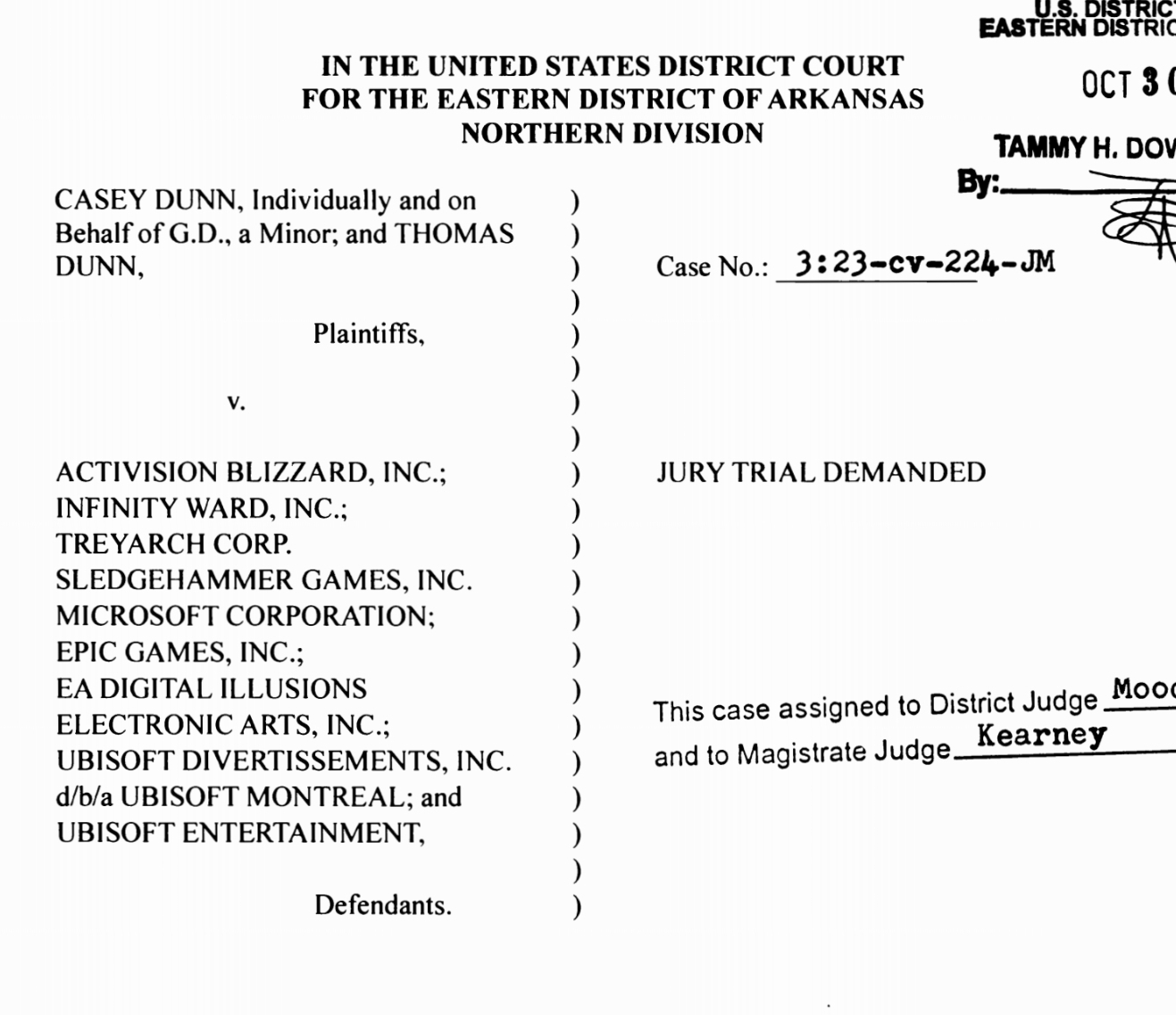- cross-posted to:
- [email protected]
- cross-posted to:
- [email protected]
Parents Sue Gaming Companies Over ‘Video Game Addiction’, Because That’s Easier Than Parenting::Video game addiction. Sigh. Big sigh, even. Like, the biggest of sighs. We’ve talked about claims that video game addiction is a documentable affliction in the past, as well as the pushback that claim has received from addiction experts, who have pointed out that much of this is being done to allow doctors to get…
Never get your mental health advice from a “technology consultant” especially one that quotes things like the DSM-5 without the required knowledge on how to apply it.
The DSM moves at a glacial pace as does many academic publications as it takes an extremely conservative approach to declaring new disorders. Most of the time it tries to classify things like “gaming addiction” under the general addiction category rather than make a new separate category for a specific form of it. Being addicted to anything including gaming is still a form of addiction and the lack of a specific category for it in the DSM doesn’t mean it magically doesn’t exist.
Tldr: this technology consultant is clueless about stuff outside of his field. Just because it beeps and boops doesn’t make him a mental health expert on the use of it.
Yes parents need to parent their kids first and foremost. However, we can’t keep just giving video game companies a pass for intentionally making their games addictive. When they’re literally hiring psychologists to pinpoint target their games for a child’s brain, that’s also a problem. Both need to be addressed.
I also want to point out that a lot of these games purposefully misclassify themselves in the AppStore. Meaning if you are a parent and you say “I want my kid to have 1-2 hours of game time, but all research tools are allowed all the time” Some games will report themselves as “Information and Reading” to get around settings. I find oftentimes the more garbagey the game the more likely it will do that.
The recent lawsuits against gaming companies over ‘video game addiction’ seem to overlook the importance of parental guidance. It’s easier to blame external factors than to address the root causes at home. The principles of the AA twelve steps teach us about taking responsibility and seeking personal growth, which can be applied to parenting as well. Just as recovering from addiction requires commitment and support, guiding children through their challenges needs consistent involvement and understanding. Instead of looking for quick fixes, parents could benefit from actively engaging in their children’s lives and setting healthy boundaries around gaming and other activities.
If only gaming companies could figure out how to get kids addicted to algebra.
Just one more variable
this is the entire cycle that keeps undergrad computer science going
It’s like when parents go after the drug dealers than blame their own kid for doing drugs.
It’s also like when you ignore that video game makers research and develop how to make their game as addictive as possible and ignore an entire thread talking about it. Oh wait…
Because it’s never the responsibility of the user.
Uh… it’s pretty generally accepted that selling drugs to kids is bad. It’s also illegal. Do you agree that it should be illegal? And if so, doesn’t comparing the two support the idea that the games should be regulated?
I don’t want to be all old man yells at cloud, but back in my day popular games were played a lot because they were primarily enjoyable for the story, the achievement of completing a particular level or boss, playing against friends, etc. And sure, you’d have the odd bad parent trying to claim their kid was addicted to Counterstrike 1.6, but it was broadly speaking nonsense. The vast majority of games were offline, or had very limited online modes built around direct competition with other players (FPS, sports games, etc), and publishers would get all their money from the initial sale, with only a few games having expansion packs, most notable The Sims.
But in the early 2010s a few things changed:
- broadband internet became ubiquitous in markets with high levels of existing gamers
- distribution of games swapped from physical media to downloads
- ‘everyone’ had a pretty powerful computer in their pocket making it much more accessible
- a bunch of people in the industry started reading about positive psychology - the idea that you can create habits through rewards - and apply them to video games to increase playtime
- those mechanics turned out to be very powerful in driving particular user behaviours, and started to be targeted at monetisation models - and so we got loot boxes, etc
So we went from a situation where video games were fun for the same reasons traditional games, or sports, are fun, to one where many video games include a lot of gambling mechanics in their core gameplay loops - loot boxes being the obvious one, but any lottery-based mechanic where you spend real money counts - in an industry with no relevant regulation, nor age limitation.
It is definitely possible for people to get addicted to these mechanics, the same way people can get addicted to casino games, or betting on horse racing, especially when for some games that is literally what the developer wants.
I agree with all your major points, well said. I will only add that back in the late 90s, MMOs started to become more popular among PC gamers, and that those were definitely designed for mild addiction (to keep players paying a monthly fee).
After WoW took MMOs mainstream (by around 2010-2012 when its playerbase peaked), I feel that lines up perfectly with your observation that developers began incorporating more and more positive feedback loops into games. I only bring this up since I wonder if there’s an actual correlation there (along with the other elements you pointed out regarding accessibility, etc.) or if it’s just coincidental timing.
Has everyone forgotten coin-ops? Or maybe I’m just old.
This started a long, long time ago, pretty much at the birth of popular casual gaming. It’s not part of the evolution, it was part of the blueprint.
The thing with coin-ops, and arcades in general, is that you still had to physically go somewhere, and have the coins to keep playing. If you walked away, someone would take the machine. Worst case scenario, the machine stopped working when it ran out of coin/token space.
I’m not denying that there are similarities, and that ultimately every game ever has been built on a fundamental mechanic of risk/reward, but it was rudimentary and broadly speaking deterministic and visible to the user (you knew how to get a free ball in most pinball games, for example).
The combination of easy payments, of very high amounts, and online competitive play where the high rollers can be multi-millionaires from anywhere in the world, and a pay-to-win mechanic makes certain modern games not just addictive, but financially crippling, if played by someone susceptible to addiction.
I agree, but I was responding specifically to the claim that the use of psychology to tweak the design of a game in favour of profitability happened in 2010 / 1990 / etc.
The fact that it’s now orders of magnitude worse is, of course, true, but it didn’t start there by any definition.
It had nothing to do with WoW, smartphones were basically to blame. 2007 was when the iPhone came out, Android followed next year, and by the early 2010s, smartphones became ubiquitous. Both the App Store and Google Market exploded exponentially in the number of apps and games. Mobile game makers soon figured out that microtransactions brought in more money than upfront payments. All the popular games started exploiting this model, such as Angry Birds, Temple Run and of course the infamous Candy Crush.
King, the company behind Candy Crush, generates over a billion dollars of revenue per year - their turnover exceeding that of several traditional PC/console game makers. In 2012, they staggering 1000% growth in just an year - and that was the trigger. That was when everyone looked at them going, “tf, why the hell are we wasting so much time and money developing AAA games, and making way less money than some cheap mobile game?”
And the rest as they say, is history.
WoW is a stepping stone, it’s used as a frequent example in Reality is Broken, which is good place to start if you want to understand where all this comes from, as well as the rather utopian hope psychologists had at the time.
I was there, and it didn’t “come from” WoW. Mtx were already popular in South Korea and China, with games like MapleStory (2003) and ZT Online (2006) being early examples, which predates mtx in WoW. Farmville also had them back in 2009, around the same time WoW started selling pets. And back then Zynga were making like a $1mil a day from Farmville mtx, and this was before WoW pet sales really took off.
Yes, WoW did play a role, but it wasn’t as big as you think - after all, it had a very niche audience, whereas games like Farmville, Candy Crush, Angry Birds etc had a much wider appeal that reached out to several age groups and audiences, whilst simultaneously being a lot more accessible - which made them so much more dangerous (in terms of addiction).
WoW appealed to the hardcore MMO gamers, gamers who were used to paying for virtual goods, whereas games like Farmville normalized mtx across for the general and wider public. Paying for virtual items was no longer something that nerds did, it was a completely normal thing. And then Candy Crush tweaked the formula even further. WoW’s mtx was a lot more benign compared to some of the shady psychological designs games like Candy Crush implemented.
I absolutely agree that Farmville had a bigger impact, especially as it was geared towards a more casual market. Showing that people who would not describe themselves as gamers would spend a lot of money on games was a huge thing that a lot of people set out to copy.
I worked at GameStop when Farmville was big. Regularly had older women come in and spend $40 to $100 dollars on Farmville cards. A couple of these women came in every week, outspending almost every “traditional” gamer I knew.
Yes! There’s a reason Microsoft bought Activision-Blizzard-King
In the past I might’ve been more critical of the parents, but honestly in this day and age?
Large publishers and developers exist to exploit people. They exploit workers by overhiring, overworking, and then firing them gracelessly whenever they’ve managed to push out the next paint-by-numbers turd they have planned. It releases to the public in an unfinished state, yet the consumer is expected to shell out hundreds of dollars not only for the base game, but for season passes, FOMO mechanics, in-game shops, gambling and other anti-consumer bullshit.
They scheme to create more and more insidious systems to keep the player hooked, all the while they’re abusing their workers, playing with their lives, and sometimes literally stealing from them.
The modern AAA gaming industry is worse than it ever has been, and these parents aren’t wrong; the games are designed to be addictive. They’d outright encourage people to mortgage their home and steal their parents’ credit cards if they thought they could get away with it.
I mean, the gambling industry uses some mobile games as learning material in how to snare players and trigger “that next button press” (source, I used to work for a large gambling company).
So, there are grounds to argue addiction on the same level as gambling addiction for some games.
I won’t read the article with such a stupid title.
In other situations they call it victim shaming. There is a reason laws exists to forbid gambling for minors. Many video games are built as loopholes to circumvent such laws. Publishers and producers must be punished for this. Parenting is not a relevant topic here, as we are talking about society.
In a society the distribution of parenting capabilities has large variability, and it does not always depends on the parents themselves, but also on environmental factors (such as work-related stressors).
As society we need to fight any predatory business model that exploits society and individuals weaknesses.
Many games work on the exact same feedback loop as gambling. Squeezing as much dopamine out of your brain as they can.
Big companies spend a huge amount on psychologists to make their games as addictive as possible.
The same way my parents had no idea how dangerous the internet could be in the late 90s, many parents won’t know about this.
This is my biggest concern about video games when I become a parent. My parents were far more concerned about “violence,” but I’d rather have a 10yo child play doom than candy crush. One might initially look more dangerous to the untrained eye, but looks can be deceiving.
100% I’ve pushed my kids towards games like Minecraft and Stardew Valley. Games that need a bit of focus and planning rather than quick fire rounds full of ads or micro transactions.
The most fun I have ever had in any game in my entire life was playing modded multiplayer Minecraft in private or non-p2w servers. The gameplay is fun and engaging, offering a wide range of experiences and great pacing. Many large modpacks do a great job of expanding on the base game’s progression cap, giving you more content to discover, and greatly improving the base-building and automation aspects of the game. Nobody is trying to make the game artificially hard so you pay for progress and the designers and developers focused on making the game as fun as possible instead of manipulating and addictive, which ironically just lead to me spending more time playing it than other games.
Here’s the thing: as a parent you had a high amount of control over what your children consume. Yes, there is peer pressure, but you can just decide to make your kid uncool or weird or quirky. My child basically doesn’t see ads. She travels with her own tablet and hotspot with ad-free services and ad-free mobile games. Tiktok and YouTube shorts is almost totally banned in my house, but she may watch a few videos specifically on my devices under my supervision if she wants to see something her friends send her. I don’t really have a problem with tiktok per se, more how it zombifies kids with constant dopemine hits. Youtube is a whitelist since don’t trust that algorithm at all.
You get the picture. I won’t say that my kid is watching things wholly appropriate for her at all times, but my mission as it stands is to keep her attention span solid and teach her moderation, so some games get banned before she ever get to play them (roblox), some get banned after me seeing the impact on her cousin (fortnite) and some get banned for impact on her (mobile games are evil). The fall out can be severe, but in this respect I’m an authoritatian parent. My word is law. Your feelings don’t matter. You’ll thank me later. Or not. You have a long adulthood play videogames.
You are also not allowed as a parent to enforce your child not playing after a certain age. It will depend on the country, but where I live you are, among other things, not allowed to forbid social contacts of your child unless there is significant harm involved. No judge would see “they are playing video games at their friends house” as serious harm.
Where do you live? I’ve never heard of anything like that.
I live in Germany. You can read about the law here, for example:
Social contacts or social contracts? Does gambling fall under this? I could see someone arguing that some of these games are essentially gambling.
Actual gambling is for adults (18+ and I think casinos are 21+). So when parents can proof the friend of their child is actively involving the child into that type of gambling they could potentially forbid the contact.
But Fortnite for example is free for kids 12 and older. There is nothing you can legally do about your child visiting a friend and playing Fortnite there.
You also can’t stop your child from coming into contact with games on smartphones other people bring to school.
This author seems pretty comfortable mocking the concept of games being addictive.
Loot boxes need to stop for sure, but things like limited-time content are 100% designed to form habits and ultimately feed gaming addiction. Season passes or weekly achievements require you to log on and grind out challenges at regular intervals to avoid missing out on rewards that are required for competitive play.
I know plenty of people who have had to make an active choice to stop playing certain games because they found they couldn’t play the game ‘on their own terms’. It sucks as an adult, but kids without fully developed brains capable of rational thinking would stand no chance.
things like limited-time content are 100% designed to form habits and ultimately feed gaming addiction. Season passes or weekly achievements require you to log on and grind out challenges at regular intervals to avoid missing out on rewards that are required for competitive play.
Hell, even subscription-based games like MMOs. After all, if you’re paying every month for something, you want to get your money’s worth.
Depends on the implementation: I liked Eve Onlines model where, yes, you had to pay the sub but your character would train skills even while offline.So at least to me there was less of this classical fear of missing out.
Ugh, don’t get me started on EVE. Like yeah, there’s an awesome game underneath it all, but the fact that they make you train your character in real time by reading skill books feels so scummy when they are billing you a monthly fee. Like that has such an obvious perverse incentive. You think those skill books take as long as they take because it’s fun? No way. They take that long because it maximises profit.
There’s a reason I used to call it World of Warcrack. That game was harder to quit than smoking cigarettes for me.
That’s part of why I never played WoW. I knew that I’d constantly be like “I’m paying for it I should be playing”.
Funny, when I played it, it was always “wow, I’m really getting a good bang for my buck.” It was a huge money saving for me because instead of going out to a bar an extra one or two nights a week, I stayed home and gamed online with friends. Never once did I think “I should play to make it worth it” I was making it worth it without a thought. lol
I had a similar thought, but moreso “i’m paying for this… why isn’t it fun?” So I stopped paying after maybe 4 months.
This is the real problem with subscriptions. Yes, they tend to be more expensive in the long run, but they also stress you out because you have to constantly think about whether or not you’re getting your money’s worth. If you buy a game, there’s no stress because even if you’re busy, you’ll have plenty of time at some point in the future to get your money’s worth.
I was quite addicted to a Facebook game back in the day. Never went more than a day without playing it and even then I had scripts to play the repetitive parts of the game while I was away. I might’ve spent $50 total on the game but I never really felt like I was missing out because of not spending money. When they got to the point where it was blatantly obvious I would miss rare items or other collectibles if I didn’t pay then I quit altogether.
I think the system could use a change but I still prefer minimal interference. It could do a lot of good if players were notified (monthly/weekly) how much they’ve played the game and how much they’ve spent. The “micro” part is probably what gets a lot of people and they never realize what they’ve paid in total.
know plenty of people who have had to make an active choice to stop playing certain games because they found they couldn’t play the game ‘on their own terms’.
Yep, this is me. stopped playing at least 2 or 3 games they forced stupid unnecessary grind or daily/weekly quests (that are basically all the content there is) on me. Nope, not doing that shit anymore.
deleted by creator
The US

Maybe those parents will understand if someone tells them that is the same thing as suing as any alcohol brand for their kid’s addiction.
As much as I see what a pointless move this is from the parents, we should acknowledge the alcohol industry and retailers have to take more responsibility to keep it away from children than game companies do. Stores can be punished if a kid goes there saying “I’m definitely 21” and they sell without checking.
There is some neglect from parents, there is the way how our society is overworked gets in the way of parents who want to do better, but a fraction of the blame can be put on game companies that sell games with gambling-like monetization without even rating it properly. They are not wrong about there being “addictive features” and “predatory monetization aimed at minors”. Even Mario Kart World Tour has these, and it’s rated E
Absolutley, you are completely correct. I also heard that in some countries microtransaccions that rewarded “Random” items are being prohibited since its the same as gambling. Which in that case suing them for that would make sense.
In my opinion (see also Dr Gabor Maté), addictions (which, I also think, can be about petty much anything) are very much mostly attempts to escape pain, when better alternatives do not seem available to a person.
So, yeah, video game addiction can be a thing, and certain game designs exacerbate that (similar to what might fuel gambling addictions and such).
But all of this perspective only distracts from whatever is causing the people/kids pain, makes them seek out games in an addicted fashion in the first place.
As a disabled adult latchkey kid, we’ve given up on actual parenting (that is, letting the US public actually have the time and energy to parent) for half a century now. In the 1970s it took all adults working to support a houshold (contast one working adult and a homemaker in the 1950s) yet the quality of life didn’t improve. We passed parenting on to teachers, and then gave them larger classes.
One of my first tasks in my game development career was to change the data type used for the main currency in [Famously Addictive Farm Simulator Game], because a user had exceeded the maximum value.
I eventually found out approximately how much IRL money this person had spent on this game…
6 figures. And not barely 6 figures.
People don’t spend that much because they’re just having fun.
There is absolutely something different about these kinds of games. It’s abusive and dangerous, and we should consider it a health hazard.
I’m glad this comment section seems to agree that some fault lies on the game companies, too. I get it that parents gotta also parent, but when games are hiring behavior/psychology experts to design their games to become addictive and suck in people’s money as effectively as possible… adults struggle enough with resisting gaming addiction, let alone kids.
I know a guy that spent all of his free time, and on average $2,000 a month, on Genshin Impact.
I have two kids. The idea that these games are not addictive is laughable. Something only someone without kids that have found roblox (or similar games) could possibly convince themselves is true. Even just looking at all FTP games I play, I can see how they are taking advantage of that need for the fix to pull money from you at the most opportune time. Lucky for me, I don’t really have an addictive personality so I’m easily able to set aside those things.
But my kids have not developed the same level of self control or self-realization yet. They just continually want that dopamine hit. We definitely limit screentime and what they play (roblox is out now). In the times we have done “device free weeks” you can absolutely see the change in behavior from the withdrawal period right after you take away the game, to at the end of the week when they barely even complain at all that they can’t play.
I remember when my older kid went away to sleep away camp for 2 weeks, and when he came back how his younger brother talking about the games seemed so foreign to him. He like had completely detoxed and didn’t care at all.
There is definitely an element of parental responsibility here too. But you what the author doesn’t seem to realize is that it’s not so easy. All of the kids are playing games these days, and it is a common past-time. While you could just say “no games” and call it a day, I don’t know of a single family that does this. Even the ones who are very strict allow their kids to play some switch games. Even the ones that think their kid has some kind of gaming addiction (and have taken away all online games) let’s their kids play certain console games as well because they don’t see it creating the same behavior. And if you open the door a bit, it’s a constant battle trying to figure out where that line in, and you’re competing against big money using experts to figure out how to win that game. It’s an extremely hard game for a parent to win.
It would be much easier if it were illegal to use these intentionally addictive mechanisms in games targeted at non-adults.
I think the most important thing to teach young people in today’s gaming market is that microtransactions are NEVER worth it. Yeah, maybe you want 500 gems to buy another builder or whatever, but then you’ll be out $10 or however much it is and nothing fundamentally changes about your experience to make it $10 more fun. Games can actually become less fun when you start spending depending on the game, because then you’re just paying to either win or make progress, which ruins the whole point of a game.
You should only ever pay money for actual content. Paying for the base game and certain types of DLC can be worthwhile. If the game has a currency you have to buy, you’re probably getting scammed.
I’m really just driving home your point here.
I played a lot of clash royale, which I loved, and people always whined about it being ptw. This is because you reach a certain point that is hard to pass with your current card levels, where your win loss ratio goes to 1-1. But what would happen is you would pay some money to upgrade your cards, and then you rise in the ranks a bit, and then right back to being at the point where you are at a 1-1 w/l ratio.
It was really just “pay to do the same thing at a higher rank.”
Yup. I don’t play Royale (and no longer Clans), but Clash of Clans was the game I had in mind for my example and it does pretty much the same thing. I got a pretty high town hall and IIRC never paid a dime, just years of grinding. It’s a game with a lot of fun mechanics, but the monetization has become unbearably annoying, intrusive, and manipulative. The last straw for me was when they fucked up the UI for no apparent reason.


















